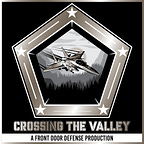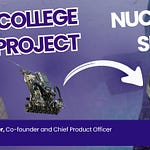Building Multi-Domain Capabilities Through Iterative Experimentation
About our Guests
Repeat guests from Episode 43, Lt Colonel Tommy Burns and Lt Colonel Aaron Ritzema are completing their tours with the 2nd Multi-Domain Task Force in Germany, where they've spearheaded some of the Army's most innovative experimentation efforts. Both officers bring operational experience to the challenge of transitioning emerging technologies from concept to battlefield capability.
As they prepare to transition to new roles, they re-joined Crossing the Valley to share their experience leading the Arcane Thunder exercise, and to give a candid look into what worked, and what didn’t, as we look toward the future.
Key Takeaways
1. Network Architecture Enables All Other Capabilities
The exercise's biggest breakthrough was achieving real-time data sharing between operations in Poland and Arizona. This network integration became the foundation for every other success, enabling live video feeds across continents and coordinated multi-domain operations. Without robust network architecture, individual technologies remain isolated capabilities rather than integrated systems.
2. Honest Assessment Accelerates Innovation Cycles
Despite multiple drone crashes and weather setbacks, the team gave themselves a "passing grade" because they proved the core digital signal flow concept. This honest evaluation—celebrating successes while acknowledging failures—enabled rapid iteration and course correction. Organizations that hide failures slow their own progress.
3. Training Systems Must Evolve With Technology
The unit broke Army records by launching 10 micro-HABs in one day (previous record was 5) because they developed deliberate training progressions from individual to collective tasks. Their success came from building human proficiency alongside technological capability.
4. Performance Standards Need Development for New Capabilities
Unlike traditional military capabilities with established time and accuracy standards, multi-domain operations lack comparative benchmarks. "We still don't even really know what good looks like yet," Burns explained. Building evaluation criteria and collecting baseline performance data must happen in parallel with capability development.
5. Human Judgment Remains Critical in Automated Systems
Even with sensors automatically connecting to shooters across domains, empowered junior leaders remain essential. The exercise reinforced that technology should enhance human decision-making rather than replace it. "There's absolutely room for empowered junior leaders to execute within commander's intent," Ritzema emphasized, highlighting the enduring importance of the "humans over hardware" philosophy.
For more on Arcane Thunder 25: https://www.dvidshub.net/news/496977/exercise-arcane-thunder-25-press-release
For more Crossing the Valley: www.valleycrossers.com











